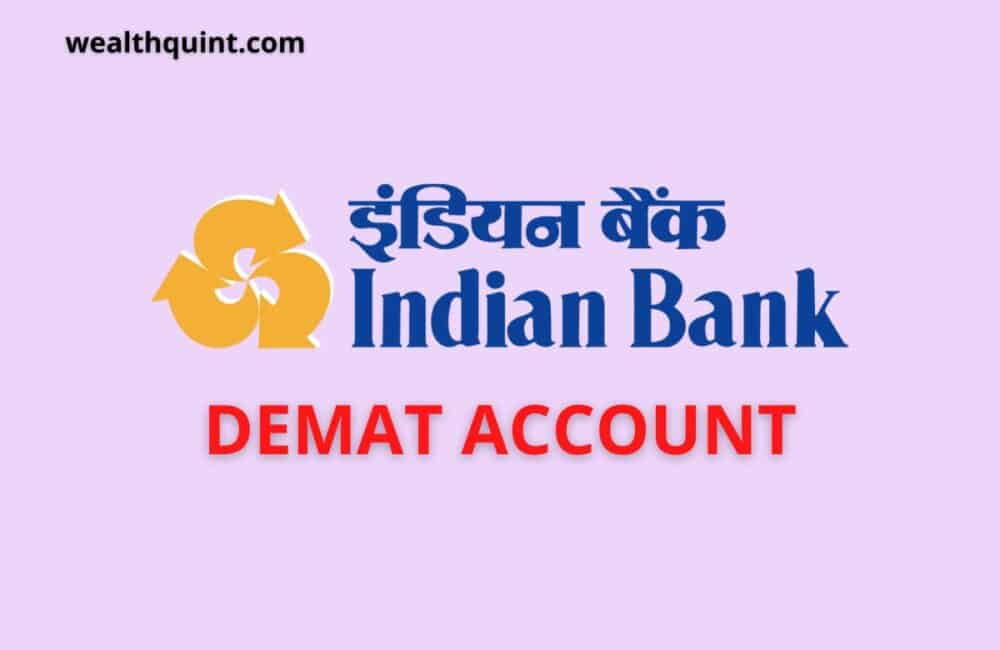When you plan to invest in a stock market, you need a Demat account. You can open a Demat account in an Indian bank. In addition, many other financial institutions like Zerodha or HDFC Securities, and Axis Direct offer to open a Demate account.
What Is A Demat Account?
A Demat or dematerialized account is a wardrobe where the shareholders keep their purchased shares digitally. Three types of Demat accounts are regular, repatriable, and non-repatriable. Regular Demat Indian citizens use accounts, but NRIs use repatriable Demat accounts.
A depository participant maintains the dematerialized account (Demat). It is usually the websites where you open your Demat account. The websites are authorized to maintain your Demat account by NSDL (National Security Depository Limited) and CDSL (Central Depository Service Limited).
Indian Bank Demat Account Benifits
- Instant transfer of shares and securities.
- Stamp duty is not required while transferring the securities in the Indian Bank Demat account.
- There will be no risk of fake securities or bad delivery.
- Less paperwork in the process of transferring securities.
- It provides the facility of nomination.
- Less transaction cost.
Indian Bank Demat Account Charges
There are six types of charges are taken as a Demat account charge that you must know
Account Opening Charge
It is a one-time charge. The account charge in India Bank is 219 INR.
Brokerage Charge
When you buy or sell any shares. Then the charges depend upon the four basic categories.
That Four categories in the Share market are
| Categories | Charges |
| Intraday | 0.01% – 0.02% |
| Delivery | 0.01% – 0.02% |
| Futures | 0.01% – 0.02% |
| Options | Rs.10 – Rs.20 per Lot |
Example
The brokerage firm’s charges for all these four categories are different for each. Brokerage charges are applicable on both sides when you buy a share or sell a Share. For instance, suppose you purchased a share and sold it by today. That will be regarded as intraday trading.
Suppose you purchased a share of one lac rupees, and firms charge you 0.02% as a brokerage. Then, you will have to pay 20 rupees as a brokerage charge on the buy-side.
Now, in an intraday, if you sold your share with a profit of one thousand. This means you sold your share for one lac one thousand rupees. And again, you will have to pay a brokerage fee of 0.02%. It means you paid 20.2 rupees brokerage on the sell-side.
Then, the sum of your total brokerage fee will be 40.2 rupees plus 18% GST on the brokerage charge. So it means 40.2x 18/100= 7.2 rupees GST.
Here, the final sum will be 40.2+7.2= 47.4 rupees.
Fund Transfer Charge:
You transfer your fund using a trading account payment gateway to your trading account. Then the brokerage firms charge a penny. However, you can transfer your funds by the IMPS, cheque, NEFT, or RTGS without paying any fund transfer charge.
Annual Maintenance Charge
The firms also charge a maintenance fee yearly for maintaining your Demat account. The annual maintenance charge in the Indian bank is 349 INR. However, the charges range between 150 rupees to 900 per annum in other firms.
DP Charges
The depository charges are applicable only on the sale side. DP charges range from 12 rupees to 30 rupees for different firms.
Call And Trade Charges
You buy or sell your shares in three ways.
- Mobile application of your brokerage firm (Free)
- Website or desktop software (Free)
- You can directly call the brokerage firm to buy or sell your shares.
When you use the service of a direct call to buy or sell your shares, the brokerage firms apply charges on it. These charges are called call and trade charges which usually range between 15-20 rupees per trade.
How To Open Demat Account In Indian Bank?
Steps to open Demat Account in the Indian Bank:
- Step 1: First, you need to visit the Indian bank merchant banking service’s website, i.e. “content.dionglobal.in”
- Step 2: On the homepage of this website, click on the menu of services.
- Step 3: Select the option of “Merchant Banking”.
- Step 4: Scroll down a bit; you will get space to fill in your details like name, mobile number, email id, city. Then, in the last column, you can write a message or comment.
- Step 5: After filling in the required details, click on the “Submit” button.
- Step 6: You will receive a call within 24 working hours from the Indbank Securities for confirmation.
- Step 7:The Indian bank executive will visit your address to collect the required documents like your ID card, pan card, photographs, bank statement to open your Demat account.
- Step 8: Besides these documents, the bank executive may ask you to fill a KYC form that will include your signature on some agreement paper, which will cover all the terms and conditions, charges, and other details.
- Step 9: Now, the bank will create your Demat account after verifying your details within three working days.
To Sum Up
A Demat account id consists of 16 digits. The first eight digits are the DP ID, and the last eight digits are client IDs.
For example, 1234567898765432. In your case, the digits may be different. But, the first eight digits will be your DP id, and the digits from 9 to 2 will be your client id.
Recommended:
Best Time Frame For Intraday Trading
Best Indicators for Intraday Trading



